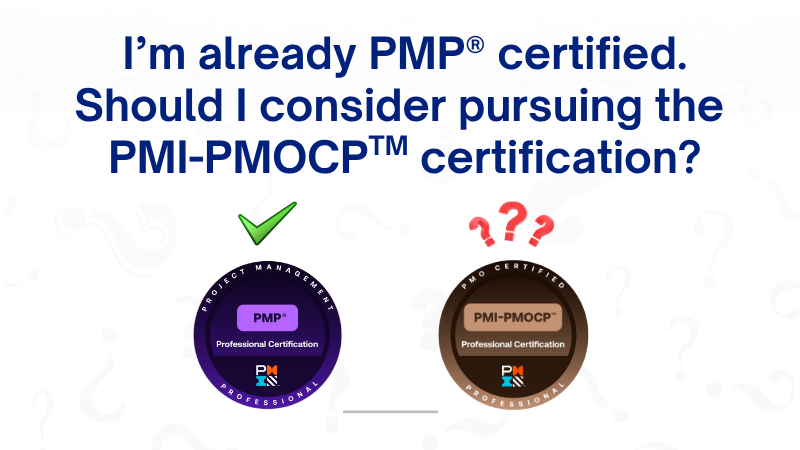
PMI-PMOCP Certification Guide 2025 – Exam Strategy, Study Plan, Career Impact and Road Map
Introduction
Project Management Offices (PMOs) are more than just administrative hubs in today’s busy business world. Businesses can adapt, provide value, and make wise decisions with the support of these strategic drives. As businesses look for professionals capable of spearheading this transformation, the PMI-PMOCP™ (PMO Certified Professional) has emerged as a highly regarded certification confirming both strategic insight and PMO leadership.
With the help of useful frameworks and leadership skills, PMI-PMI-PMOCP™ enables professionals to create, run, and develop PMOs that support organizational objectives. It positions certified leaders as important forces behind corporate transformation by signifying a change from traditional project oversight to strategic value delivery.
This article offers a detailed guide on obtaining the PMI-PMOCP™ certification, covering the exam layout, study schedule creation, leadership development, PMO capacity improvement, and finding resources and prep tools. It emphasizes the importance of developing leadership skills, improving PMO capacity with actual knowledge, and finding practical exam-day advice to maximize the certification’s impact on your career.
Unlocking career potential with PMI-PMOCP™
The growing focus on value-driven delivery and strategic alignment across businesses is changing the function of PMOs. Through specialised credentials like the PMI-PMOCP™, this shift has created a fantastic opportunity for people to progress in their careers. The certification attests to a deep understanding of PMO operations, governance frameworks, and business integration and is intended for PMO executives, team members, and portfolio professionals.
The PMI-PMOCP™ is a strategic facilitator for career progression that goes beyond a certification. It prepares professionals for positions influencing corporate decision-making rather than just operating coordination. With this certification, applicants can pursue senior roles that prioritize leadership and stakeholder engagement, such as Head of Strategic Initiatives, Enterprise PMO Manager, or PMO Director. Possessing the PMI-PMOCP™ boosts your reputation and demonstrates to potential employers that you are capable of starting, expanding, and optimizing PMOs for long-term impact in a global job market that is increasingly focused on measurable skills.
According to the Earning Power: Project Management Salary Survey—Twelfth Edition, only 61% of PMOs believe they are successful, and 93% of unbacked PMOs say their value is not understood by executives. These findings highlight the growing need for certified professionals who can lead strategic, value-driven PMOs.
Additionally, the certification promotes professional mobility across sectors and locations for those who want to lead change in complex settings. For seasoned professionals prepared to take on more senior leadership responsibilities, the PMI-PMOCP™ is a wise, forward-thinking investment in career development.
The Role of PMI-PMOCP™ in today’s evolving PMO landscape
The PMI‑PMOCP™ certification is essential for confirming the strategic abilities needed by modern businesses, as PMOs expand beyond their traditional administrative duties.
In a Broadcom survey, 96% of 501 multinational companies said they were becoming more reliant on PMOs to centralise project management and improve value delivery; 98% said they thought PMOs were critical, and 93% said they intended to grow their PMO operations. This modification emphasises the necessity of having skilled professionals lead these next-generation PMOs.
NTT DATA’s “Evolution of the PMO” report highlights how digitally empowered, agile PMOs are evolving into strategic value centres, leveraging analytics and artificial intelligence to improve productivity and decision-making. Because the PMI‑PMOCP™ evaluates all of these skills, these PMOs require leaders with expertise in governance maturity, digital tool execution, and integration with business strategy.
A great example of how they may increase their delivery flexibility is the PMO of Melbourne Airport, which used hybrid systems and became the only provider during COVID-19. By equipping them with the frameworks, stakeholder engagement techniques, and governance understanding required for PMOs in the digital era, certification equips PMO executives to spearhead such transformations.
PMI-PMOCP™ holders are prepared to guide companies through challenging transformation by collaborating closely with strategic portfolio and performance management methodologies. This ensures that PMO activities are not only monitored but also optimized for a company-wide impact.
Advancing from execution to strategy: A career shift enabled by PMI-PMOCP™
Building on this solid base, the PMI-PMOCP™ certification turns into a strong enabler for those trying to move from execution-centered jobs to strategic leadership posts. By arming PMO practitioners with the systems and competencies required to make significant decisions, it bridges the gap between operational delivery and corporate value realization. Experts who are certified manage portfolio priorities, align projects with corporate strategy, and assess results important to executive stakeholders. They are trained to handle tasks beyond the constraints of deadlines and scope. This change makes them as essential to corporate transformation by turning their function from task fulfillment to strategic advice.
In actuality, this change is quite apparent. After receiving PMI-PMOCP™, many professionals formerly in charge of project coordination have moved into roles such as Strategic Realization Office Lead, Director of Enterprise PMO, or Head of Delivery Governance. These positions call for more than just process knowledge; rather, the capacity to influence, negotiate, and generate results consistent with company objectives is required.
PMI-PMOCP™,’s focus on strategy alignment, advantage realization, and maturity models makes this career leap possible. For those seeking substantial expansion, it provides a clear path to influence portfolio-level decisions and lead the business from the front, making the shift from project manager to strategic leader a reality.
A closer look at the exam structure and core domains
The PMI-PMI-PMOCP™ exam is developed to evaluate both theoretical knowledge and practical capabilities since PMO leadership necessitates the development of real-world competencies. It assesses a candidate’s capacity to consciously plan, create, carry out, and improve PMO operations in a range of organizational contexts. Focused research necessitates domain and structural knowledge for subject matter experts.

Learn the PMI-PMOCP exam structure: 120 questions, 165-minute duration, online & in-center availability, and psychometric scoring. Prepare with confidence.
Key Exam Structure:
- Format: 120 multiple-choice questions (100 scored + 20 unscored pretest items)
- Duration: 165 minutes (2 hours 45 minutes), with one optional 10-minute break
- Mode: Available both online (proctored) and at exam centers
- Scoring: Pass/fail based on psychometric analysis (no fixed cutoff score)
Core Exam Domains and weightage:
- Organizational Development and Alignment (16%): Focuses on building organizational project management maturity and capability.
- PMO Strategic Elements (18%): Covers PMO vision, mandate, governance, and stakeholder engagement.
- PMO Design and Structuring (18%): Examines service design, customer-centricity, and value proposition.
- PMO Operation and Performance (15%): Assesses service delivery, resource management, and onboarding processes.
- PMO Enhancement and Effectiveness (18%): Emphasizes performance measurement, maturity models, and continuous improvement.
- People (15%): Evaluates leadership, interpersonal skills, and strategic thinking.

Master the 6 core domains of the PMI-PMOCP exam—get familiar with what matters most and where to focus your preparation.
Successful completion of the exam and practical implementation of ideas in real-world PMO scenarios are prerequisites for a thorough comprehension of these fields.
Designing a Smart Study Plan using the Exam Content Outline (ECO)
Having a well-organised and targeted study plan is essential for passing the PMI-PMOCPTM test. You may be sure that your preparation aligns with the fundamental abilities required of high-performing PMO staff by using the Exam Content Outline (ECO). Because it provides detailed instructions on domains, tasks, and enablers, the ECO is the most reliable place to start when creating your exam strategy.

Maximize your PMI-PMOCP prep with this 6-step study plan—prioritize domain weights, apply case-based learning, and grow strategic PMO skills.
Steps to create an efficient study schedule:
- Get to know the Domain Weights: Based on the domain percentage (e.g., PMO Strategic Elements and PMO Design each carry 18%), give study time top focus.
- Divide Projects and Enablers: Translate every domain into actual situations to internalize ideas and gauge practical understanding.
- Mapping Experience to Competencies: Find locations where your hands-on PMO knowledge complements or falls short of ECO job coverage.
- Assign objectives for weekly study: Assign particular domains per week using a calendar, therefore balancing theory review, case analysis, and practical experience.
- Use Case-Based Learning: Deepen your awareness of stakeholder engagement, service design, and performance measures by using case studies and sample scenarios.
- Regular Reviews and Revisions: Set weekly reviews and strengthen underperforming areas found through self-evaluations or mock examinations.
Keeping up with the ECO helps you concentrate on your studies and learning PMO leadership skills that are both career-oriented and relevant to exams.
Growing your strategic thinking and leadership skills
The ECO’s study plan equips candidates with leadership and other critical abilities that go beyond test preparation. The PMI-PMOCP™ certification aids in the development of strategic thinking and leadership skills that are necessary for directing organisational effect through the PMO.

Grow your PMO leadership impact with PMI-PMOCP™ – from strategic alignment and governance to stakeholder influence and executive presence.
The PMOCP™ process plays a vital role in supporting leadership and strategic development, like:
- Improves strategic alignment: Enhances your capacity to align portfolio and program results with organizational objectives and long-term vision.
- Develops stakeholder engagement capabilities:Builds stakeholder engagement skills by enhancing communication, negotiating, and relationship-building across executive, functional, and delivery teams.
- Fosters systems thinking: Encourages systems thinking by showing you how to evaluate linkages across projects and portfolios to provide a more expansive viewpoint.
- Enhancing governance and risk leadership: Arms you with instruments to proactively handle strategic risks and set up efficient decision-making systems.
- Supports data-informed decision-making: Encourages the use of key performance indicators and maturity models to drive ongoing improvement.
- Builds executive-level presence:Helps you portray PMO value in business terms and direct influence at the leadership table, establishing an executive-level presence.
Professionals grow into forward-thinking leaders who help the PMO serve as a catalyst for strategy execution and corporate transformation via the PMOCP™ certification process.
Strengthening your PMO capabilities with practical knowledge
Building realistic, hands-on skills is vital as PMOs become strategic allies inside companies. Meant to improve not only theoretical understanding but also the practical application of PMO ideas across a range of business scenarios, the PMI-PMOCP™ certification is also meant to help. By means of its six key domains, the certification assists professionals in enhancing their capacity to plan and run PMOs that match the objectives of the company. Candidates acquire knowledge on how to establish performance measures that show quantifiable impact, execute governance systems, and define distinct PMO service offerings.
Moreover, stressed in the program stresses capacity building via maturity assessments, feedback systems, and continuous improvement approaches. PMO leaders may routinely evaluate success and change their services to meet changing corporate demands using these tools. Furthermore, the certification strengthens core talents in benefit realization, stakeholder management, and resource planning. Professionals become better prepared to head high-performing PMOs supporting both agile and traditional delivery environments by means of this understanding.
The pragmatic frameworks discussed in the PMI-PMOCP™ program help you to develop fit-for-purpose ideas, whether you are building a new PMO or improving one already in place. Maintaining long-term value and positioning the PMO as a reliable strategic player in the company depends on this capacity.
Tools, resources, and prep courses to accelerate your growth
It takes more than just reading to get ready for the PMI-PMOCP™ certification. A strategic plan needs to be backed up by relevant materials, instructional materials, and systematic learning in order to be successful. For PMO experts looking to increase their knowledge and improve their test preparation, using targeted information is essential.
Your preparation route is supported by a number of high-quality materials. These materials make it possible to use concepts in real-world PMO scenarios in addition to passing the exam.
Suggested learning resources and tools include:

Ace the PMI-PMOCP exam with the right resources: ECO, case studies, question banks, and memory aids like flashcards and mind maps.
- Exam Content Outline (ECO): The ECO serves as the foundation for all study plans. It divides areas, chores, and facilitators that you have to learn.
- Case Studies and Real-World Scenarios: Connect theory to real-world PMO decision-making by using industry case studies.
- Practice Exams and Question Banks: Regular exams help expose areas of deficiency and prepare you more effectively for exams using practice exams and question banks.
- Flashcards and Mind Maps: Excellent for remembering concepts, models, and vocabulary via flashcards and Mind Maps.
PMO Capability Maturity Models and Templates: Help you to grasp strategic alignment and operational excellence.
A selection of the best preparation programs:
• Instructor-led boot camps focused on domain-wise learning
• On-demand video lectures enabling flexible study
• Peer discussion groups and study cohorts for collaborative learning
Exploring thought leadership blogs, PMO podcasts, and LinkedIn learning spaces helps bring in wider perspectives and expert insights. The newly launched PMOCP4U LinkedIn group offers a dedicated space for PMO professionals and PMI-PMOCP™ aspirants to connect, exchange resources, and grow together. Building lasting capability in PMO leadership and true exam confidence, depends on combining structured preparation with practical, real-world dialogue
Exam-day confidence: Tips to manage time and approach questions
More than technical ability is needed for success on the day of the exams. It calls for confidence, concentration, and a well-practiced approach. The PMI-PMOCP™ exam seeks to assess your capacity to apply PMO ideas in realistic and sometimes difficult situations as well as your knowledge of PMO concepts.
Time management and a bold approach to the exam are crucial:

Maximize your exam success with these 5 time-tested PMI-PMOCP strategies—clarity, direction, pacing, and smart elimination.
- Start your day with clarity: If you are taking the exam online, arrive early for check-in or system testing, get a full night’s sleep, and eat properly.
- Read the directions thoroughly: During the first several minutes, get acquainted with the navigation and structure of the questions.
- Adopt a three-round approach: First, respond to questions you are certain of. Second, try rather challenging ones. Last, go back to any questions marked or time-consuming.
- Track your time without pressure:Target to finish the first 60 questions in around 80 minutes, allowing adequate time for the other parts, so monitor your time without pressure.
- Employ elimination techniques: Especially in scenario-based problems, eliminate wrong possibilities to enhance accuracy. Wise optional break: Use this time to refocus and reset for the second half of the exam.
Supported by thorough preparation, a calm and organized approach will enable you to negotiate the exam with confidence and clarity.
From certification to career growth: Making the most of PMI-PMOCP™
Getting the PMI‑PMOCP™ certification is just the first step; true professional development results from your use of it. According to the Master of Project Academy’s recent data, 35. 8% of project-related certified professionals saw a 10% plus salary increase after getting their credentials, and 41. 1% found promotions or new positions. This implies that rather than only validating abilities, certification results in noticeable progress.

PMI-PMOCP isn’t just a certification—it’s your launchpad to leadership, strategic impact, and better pay.
In your role as a PMO specialist, you aim to utilize your qualifications for actual career advancement:
- Highlight measurable results:Show projects where your PMO techniques enhanced performance, governance, or stakeholder satisfaction to position yourself as a business-value driver. Highlight measurable outcomes.
- Aim for strategic PMO roles: Many PMOCP™ holders assume leadership positions like PMO Director, Portfolio Governance Manager, or Head of Delivery Strategy, roles that call for the precise skills indicated by the certification.
- Leverage in job negotiations: Negotiate compensation, role level, or responsibility using achievements linked to credentials. Usually, certified professionals have greater initial pay.
Organizations are also aggressively seeking PMO-certified specialists to bridge the gap between strategy and implementation. Certification like PMOCP™ have genuine market relevance as PMOs more and more promote hybrid delivery, data-driven decision-making, and digital transformation. You must possess not only process-oriented skills but also strategic thinking, data literacy, and an agile mindset.
Action plan for post-certification success:

PMOCP™ is just the beginning. These 4 post-certification strategies can define your leadership path and strategic influence.
- Refresh your brand: Build your brand identity by using PMOCP™ on LinkedIn, your resume, and profiles while sharing success stories related to corporate influence.
- Communicate with PMO circle: Take part in PMO-oriented conversations, podcasts & webinars, and more in person to network and share ideas and raise awareness.
- Pursue high-impact internal projects:To show strategic leadership, volunteer for internal cross-functional or digital project programs inside your company.
- Seek formal or informal mentorship:Ask senior PMO leaders for advice on managing strategic roles or growing PMO capacity and look for formal or informal mentorship.
You are not just confirming your abilities by deftly matching your certified skills to organizational needs and highlighting your impact, but also hastening a deliberate move into senior PMO leadership. The PMI PMOCP™ can be the catalyst that changes your career path, thereby converting a certification into permanent professional development.
Conclusion
The PMI-PMOCP™ certification is more than simply a scholastic achievement in today’s evolving PMO landscape; it is a strategic gateway to leadership and professional advancement. From the beginning of the planning process, professionals gain insight on how to maximize stakeholder impact, align PMO duties with company vision, and provide demonstrable value. Through a well-organized study plan, a deep understanding of the Exam Content Outline (ECO), and an emphasis on real-world application, candidates get a mix of knowledge and leadership abilities that are immediately applicable in the workplace.
When experts look into the certification, they find several important questions, such as:
- How does PMI-PMOCP™ distinguish itself from other project management certifications?
- Will this certification enable me to advance to a strategic or leadership position?
- How may I show my employer the advantages of certification?
- Do long-term professional benefits outweigh the time and money invested?
- How can I apply and maintain my knowledge if I pass the examination?
These questions are not only genuine, but they also provide insights from professionals who are about to make important advancements. The answer depends on how the certification is used.
I had the opportunity to speak with PMI’s Kim Marcelliano about the strategic relevance of the PMI-PMOCP™ certification.
Upcoming PMI-PMOCP™ programs led by me will offer a structured path for professionals looking to deepen their PMO capabilities and earn this strategic credential. I’m excited to support and share these initiatives as they unfold.
Upcoming PMI-PMOCP Exam Prep Training 2025:
Online PMI-PMOCP Bootcamp:
- 27–28 September, 9am-5pm, CDT | Link: https://bit.ly/4mrfBHo
- 7-8 November, 7 am – 3 pm CST | Link: https://bit.ly/3FRlr4i
- 15 – 16 November, 9am-5pm, CST | Link: https://bit.ly/4jbZGcY
Direct PMI-PMOCP Bootcamp, Dallas, USA :
- 17-18 November, 9am-5pm, CST | Link: https://bit.ly/3Zqlgn2
- 13-14 December, 9am-5pm CST | Link: https://bit.ly/4drorAA
When used strategically, PMI-PMOCP™ not only validates your expertise but also positions you to drive change, provide value, and shape your company’s future through a productive PMO.
#PMIPMOCP #PMOCertification #PMOLeadership #ProjectManagement #StrategicLeadership #PMOCareer #DharamSingh #vCareProjectManagement #PMIATP #PMOCPExamPrep #PortfolioGovernance #PMOTransformation #ExamSuccess #PMOStudyTools #PMOCPJourney











Recent Comments